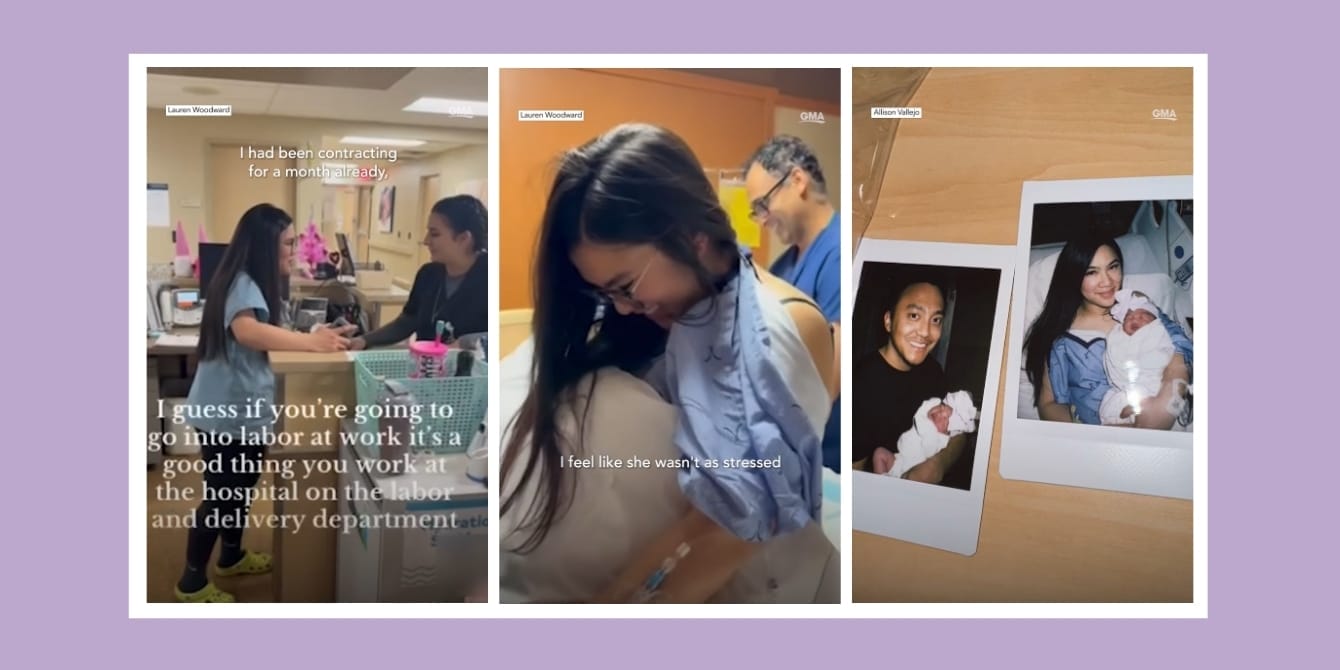For most people, going into labor means rushing to the hospital—but for Allison Vallejo, it meant staying exactly where she was.
At 37 weeks and 3 days pregnant, labor and delivery nurse Allison Vallejo showed up for her shift at the hospital, thinking it would be just another day. Despite having contractions for nearly a month, she dismissed the idea that labor was truly starting. “I’m not ready—I’m not having a baby yet,” she told herself.
But nearly 10 hours into her shift, at 4:55 a.m., her water broke. Hours later, Allison welcomed her daughter Julia at 12:16 p.m.—in the very place she spends her days helping other moms bring their babies into the world.
She shared her story with Good Morning America, and it’s a full-circle moment that’s equal parts beautiful, surreal, and deeply human.
When the nurse becomes the patient
For most parents, labor begins in the comfort of their home or with a hurried drive to the hospital. But for this labor and delivery nurse, it began mid-shift—on the very floor where she’d spent countless nights helping others bring babies into the world.
“I’m pretty stubborn,” Allison admitted. “I was like, no, I’m not having a baby. I’m not ready. It’s like about three weeks early.”
But her coworkers—fellow labor nurses—had a different instinct. “Right when she showed up, I was like, you’re 100% going into labor at some point during this shift,” one colleague recalled.
By the time her water broke, Allison had lasted nearly 10 hours on the clock. “That’s when I gave in,” she said. “I couldn’t be stubborn anymore. I had to check myself in.”
Related: Labor & delivery nurse finally gives birth—what shocked her the most
When expertise adds anxiety
As a labor and delivery nurse, Allison knew the process, the people, and the plan. But sometimes, knowing too much can be a double-edged sword.
“Having the knowledge of like, the labor and delivery side, you get a little bit anxious knowing what can happen,” she shared.
It’s a familiar paradox for many in healthcare: knowledge brings comfort, but also a heightened awareness of every possible complication. And yet, in that moment, what grounded her was the support of the team she trusted most—nurses who had become friends, and friends who had become like family.
Related: Am I in labor? 5 early signs of labor to know about
How work family became her birth family
Allison had planned to have her husband by her side, but the speed of her labor meant he couldn’t make it in time. Instead, her coworkers stepped in—not just as medical professionals, but as friends who had walked countless families through the same journey.
“I really appreciate my whole team for being there and being able to take care of me so well,” she said.
One nurse noted, “Even though she didn’t have [her partner] around, I feel like she wasn’t as stressed as she would be because she had all of us there for her, too.”
A poetic delivery—and a perfect reminder
Despite the surprise timing and the emotional whirlwind of becoming a patient in her own unit, Allison says the experience couldn’t have been more perfect.
“My whole labor and delivery went so perfectly; I couldn’t have asked for anything better,” she said, expressing her gratitude. In the end, it wasn’t just the arrival of her daughter that moved her—it was the care, compassion, and deep connection she felt with her team.
This story didn’t just end with a baby in her arms. It ended with a new appreciation for the people she works beside every day—and for the power of showing up for one another in life’s most vulnerable moments.
The bottom line
Allison’s story captures the full-circle beauty of motherhood: the vulnerability, the surrender, and the strength it takes to trust others in your most exposed moments.
But more than that, it highlights something deeper—that even the most capable among us need support. That no amount of training or experience can take away the emotional weight of birth. And that sometimes, the most unexpected moments reveal the quiet strength of the communities we build around us—at work, at home, and in motherhood.
In a world where so many moms are expected to hold it all together, stories like Allison’s remind us that we were never meant to do it alone. Whether you’re laboring in a hospital bed or laboring through the emotional demands of parenting, being held by others—emotionally, physically, communally—is not a luxury, it’s essential.
This moment wasn’t just poetic because of where it happened. It was powerful because of who showed up, and how that support shaped the story. That’s the kind of full-circle moment every parent deserves.

